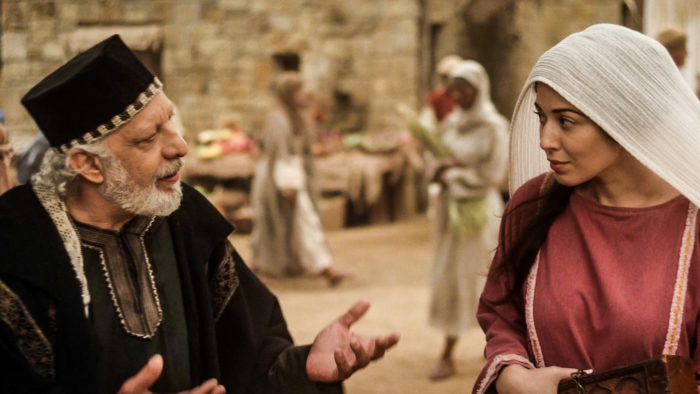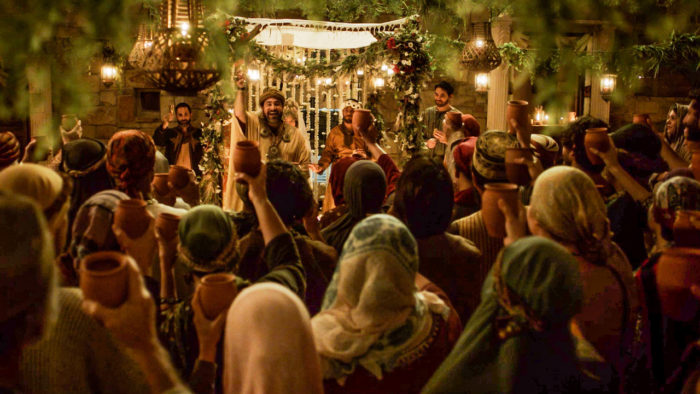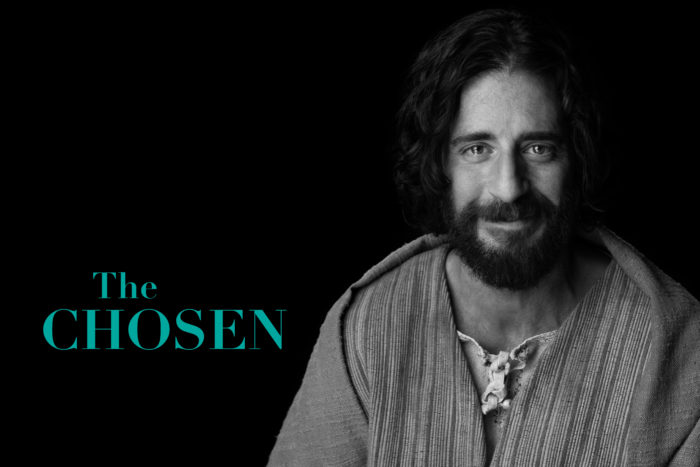The Chosen: Speculative Fiction Meets a Factual Savior
A critic of faith-based films could look at The Chosen with easy skepticism: “Why is someone trying to make yet another Jesus biopic? It’s not like we’re hurting for films inspired by the gospels. Why play it safe rather than branch out and take some real creative risks? When will Christian filmmakers ever grow up?”
I can understand such concerns. After all, I’ve written elsewhere about the bastardization of Christian filmmaking. My opinion of the typical faith-based project is anything but flattering.
Nevertheless, I have good news (of great joy, you might say) for critics like myself: The Chosen is anything but your typical faith-based project.
This is different. Much different.
To boldly go where no gospel story has gone before

From left: Andrew and Peter on the Sea of Galilee. (All photos come from The Chosen’s press kit)
Led by writer/director/producer Dallas Jenkins, the filmmakers have chosen to use the format of a multi-season TV show, giving the narrative ample room to breathe, and thus avoiding just hitting the highlights of the gospels before the credits roll. Furthermore, the show approaches the topic of Jesus’ ministry, not primarily from Christ’s perspective, but from the perspective of those around him. As Jenkins himself has stated, “[I]f the audience can encounter Jesus through the eyes of those who met Him, the audience can be impacted in the same way they were.”
The genius behind this approach seems obvious in retrospect. While Christ is the truest and greatest protagonist the universe has ever known, there is, by necessity, a bit of a disconnect between His perspective and that of every other human being in history. Jesus is infinitely admirable, yes, but not easily relatable. There are limits to how a sinful and finite audience can relate to a holy and infinite character.
It would be a gross misstatement to say that Jesus is not the focus of The Chosen. But rather than His experience being the focal point, it is His work in and through the lives of others—as they experienced it—that drives the story forward.
As such, we connect more easily and readily with the characters in this story because we are just like them. And when they encounter Jesus—and especially when they are transformed by His presence—we can relate that much more fully to their experience.
What would Jesus do?
Make no mistake, The Chosen is historical fiction: it uses Scripture as a source by which to imagine what may have happened outside and behind—and, yes, inside—the stories presented to us in the gospels. As a work of historical fiction, the show is not completely unlike many other cinematic Bible stories embraced by the Christian community over the years, including The Passion of the Christ (2004), The Ten Commandments (1956), Risen (2016), The Prince of Egypt (1998), and The Young Messiah (2016). All of these films embellished their Biblical source material for dramatic efficacy.
In a similar vein, The Chosen uses artistic license when needed, but always in a way that exalts, not dishonors, what we already know about the Biblical narrative. To put it another way, The Chosen is speculation, not subversion.
Still, it is understandable that a religious viewing audience would be cautious in embracing such an approach. Fortunately, the producers of the show have demonstrated that same caution. They have taken great pains to maintain a reverent posture toward God and His Word. This reverence is evident, even when the script calls for inserting bits of dialogue in well-known scenes or adding completely new scenes not detailed in the Scriptures.

In episode 2, Nicodemus (who had tried to cast demons out of Mary Magdalene) finds her healed and healthy after an encounter with Jesus.
Why so serious?
Another unique aspect of this series is its affable humor. In contrast with the slapstick comedy I typically enjoy, the understated humor in The Chosen doesn’t just tickle the funny bone, it provides a gut-level, soul-deep sense of mirth.
To a degree, we know the characters in this story already. The scriptwriters often extrapolate on that knowledge to show us a humorous side to the gospel narratives—and Christ himself—that is rarely seen.
While the humor in the show is far from pervasive, some might struggle to see a Jesus who winks and makes jokes. But why not? A truly holy being will be a truly happy being. Based on the testimony of Scripture itself, we can surmise, in the words of Randy Alcorn, that “the gladness of Jesus exceeds that of all humans who have ever lived.” Or, as John Piper puts it:
[T]he glory and grace of Jesus is that he is, and always will be, indestructibly happy. I say it is his glory, because gloom is not glorious. And I say it is his grace, because the best thing he has to give us is his joy. “These things I have spoken to you, that my joy may be in you, and that your joy may be full” (John 15:11; see also 17:13). . . . Jesus Christ is the happiest being in the universe.1
The Chosen gives us glimpses and peeks into that reality, and the show is more engaging because of it.

Rejecting mediocrity, embracing excellence
When it comes to artistry, The Chosen is not your typical faith-based feature. The script is smartly written, fleshing out the characters we know and love to such an astounding degree that we know and love them even more. Almost every episode is structured (at least loosely) with a small narrative arc. Of course, with this being a multi-season show, there are episodes that end on something of a cliffhanger, leaving the audience itching to know what happens next. There are a few anachronisms here and there, but nothing that drags the quality of the production down.
Speaking of which, the production values are all top-notch, including the cinematography, sound mixing, costumes, editing, and set design. The visual effects are outstanding, too—meshing so well with the practical sets that some of the effects might go by completely unnoticed. (I myself did not realize how some shots were digitally altered until after watching behind-the-scenes footage.)
To top it all off, the acting is uniformly good. There’s not a cringe-worthy thespian to be found in the entire series. And some of the actors—those who play Matthew, Nicodemus, and Peter’s wife for example—are outright superb.
If I had to critique something, it would be the musical score. While it more than adequately serves the dramatic needs of the show (sometime to powerful effect), I’d have preferred less droning and more thematic texture. There are a few repeating motifs (including one for Jesus), but it would have been stellar to hear more recognizable themes associated with each of the main characters. Of course, this is only the first season, so it’s possible that those character themes already exist in part and parcel, and will come to greater fruition later on.
It’s not safe, but it’s good
In summarizing the quality of Season 1 of The Chosen, Moviguide.org says the following:
At the core of its success is brave, artistic storytelling choices. They bring new life to the familiar tales. The writers balance perfectly between faithful biblical interpretation and a willingness to use their imagination. . . . There’s little doubt that THE CHOSEN will soon become one of the most well-known and celebrated pieces of Christian media in history.
That last part may be a bit preemptively presumptuous. However, I see there being real potential with The Chosen becoming one of the most well-known and celebrated pieces of Christian media in our lifetime—and possibly beyond.
Yes, The Chosen is that good—not by playing it safe, but by taking creative and calculated risks. Perhaps paradoxically, by veering so deeply into uncharted waters, and by choosing a long-form multi-season format, The Chosen upholds rather than undermines the gospel narrative. It does not seek to replace Scripture, but to complement Scripture. It needs to be seen to be believed.
No, The Chosen isn’t your typical faith-based production. This is different.
It’s time we got used to different.

Editor’s note: You can find The Chosen on VidAngel, or download the app (Apple or Google) to stream the series free. You can also purchase season 1 on Bluray/DVD.
- Piper, John. Seeing and Savoring Jesus Christ, Crossway, 2004, pages 35–36. ↩






































Oh hey, Nicodemus is That One Guy.
Yes, indeed! He sometimes goes by Erick Avari. 😉
Lol that made me laugh pretty hard.
He was in that one thing, and also a bunch of bit parts on all the murder mystery shows.
Amen! Well said!
Sounds like an interesting series that I need to make time to watch!
On the topic of joy, I haven’t seen the show and can’t comment first-hand how it portrays Jesus. Having said that, winking and making jokes are not necessarily signs of joy. C. S. Lewis wrote in The Voyage of the Dawn Treader, as the ship approached Aslan’s country, that the joy of the crew increased steadily. But they joked less and in fact talked less. Lewis wisely observed that joking and joy are not synonymous–at particular times joking is nearly the opposite of joy, in fact.
As for the rest of what was mentioned about this production, it sounds like they’ve made some good creative choices. Thanks for writing this post about it!